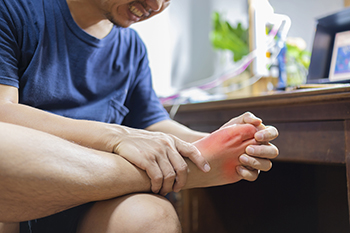Causes and Symptoms of Gout
Tuesday, 31 December 2024 00:00
Gout is a form of arthritis that results in sudden, severe pain, swelling, and redness, often affecting the big toe. It is more common in men, particularly those over the age of 40, although it can affect women, especially after menopause. Gout occurs when excess uric acid builds up in the bloodstream, forming sharp crystals that accumulate in the joints. This typically happens due to dietary factors, such as consuming high-purine foods like red meat, shellfish, and alcohol. Additionally, obesity, dehydration, or certain medical conditions like high blood pressure or diabetes can significantly contribte to developing gout. During a gout attack, the affected joint becomes intensely painful, swollen, and inflamed. While medication can help control symptoms, recurring gout attacks can lead to joint damage over time. A podiatrist can help manage gout by providing treatments like anti-inflammatory medications, dietary guidelines, and customized footwear to reduce joint stress. They can also assist in preventing future flare-ups. If you are experiencing gout symptoms, it is suggested that you schedule an appointment with a podiatrist.
Gout is a painful condition that can be treated. If you are seeking treatment, contact Dr. Thomas Madden from Advanced Foot Care Center. Our doctor will treat your foot and ankle needs.
What Is Gout?
Gout is a form of arthritis that is characterized by sudden, severe attacks of pain, redness, and tenderness in the joints. The condition usually affects the joint at the base of the big toe. A gout attack can occur at any random time, such as the middle of the night while you are asleep.
Symptoms
- Intense Joint Pain - Usually around the large joint of your big toe, and it most severe within the first four to twelve hours
- Lingering Discomfort - Joint discomfort may last from a few days to a few weeks
- Inflammation and Redness -Affected joints may become swollen, tender, warm and red
- Limited Range of Motion - May experience a decrease in joint mobility
Risk Factors
- Genetics - If family members have gout, you’re more likely to have it
- Medications - Diuretic medications can raise uric acid levels
- Gender/Age - Gout is more common in men until the age of 60. It is believed that estrogen protects women until that point
- Diet - Eating red meat and shellfish increases your risk
- Alcohol - Having more than two alcoholic drinks per day increases your risk
- Obesity - Obese people are at a higher risk for gout
Prior to visiting your podiatrist to receive treatment for gout, there are a few things you should do beforehand. If you have gout you should write down your symptoms--including when they started and how often you experience them, important medical information you may have, and any questions you may have. Writing down these three things will help your podiatrist in assessing your specific situation so that he or she may provide the best route of treatment for you.
If you have any questions, please feel free to contact our office located in Killeen, TX . We offer the newest diagnostic and treatment technologies for all your foot care needs.




